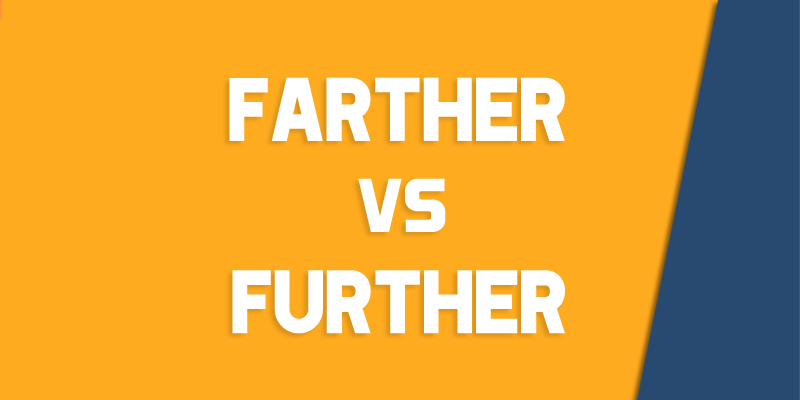Farther vs. Further – What’s the Gist?
Believe it or not, these two terms are somewhat related. They are both comparative degrees of the word far. There are some nuances of which to be aware, however.
- Farther is a modifier.
- Further functions both as a modifier and as a verb.
Once you understand the differentiation, choosing the correct word should become easier.

How to Use Farther in a Sentence
Farther definition: As a modifier, farther acts both as an adverb and as an adjective. As an adverb, farther means at or to a greater distance than before; or to a greater extent.
For example:
- The new runner ran farther than he had the day before. (Adverb)
- He did not think he had the stamina to travel any farther that night. (Adverb)
Farther is used to refer to literal, physical distances. This is part of what differentiates it from further (more on that below).
Farther also acts as an adjective, where is means to be more remote.
For example:
- The pioneer family traveled to the farther side of the territory. (Adjective)
How to Use Further in a Sentence
Further definition: Further functions as an adverb, an adjective, and a transitive verb.
As an adverb, further means to a greater degree; or in addition.
For example:
- If being snarky were not enough, he further maddened her by being deliberately obtuse. (Adverb)
- The city school had a large complement of teachers. Further, it had support staff, maintenance personnel, and cafeteria workers. (Adverb)
As an adjective, further means going or extending beyond.
For example:
- After publishing The Lion, the Witch, and the Wardrobe, C. S. Lewis wrote further volumes of the Narnia story. (Adjective)
Additionally, as a transitive verb, the term further means to help forward.
For example:
- After receiving her bachelor’s and master’s degrees, she furthered her education by obtaining a doctorate degree.
While farther is used for physical distances, further is used to refer to figurative or metaphorical ones. Consider our example above where a student “furthered her education.” Her education didn’t move from one physical space to another; it did, however, figuratively move forward or progress, which is why we use the word further.
Outside Examples of Farther vs. Further
- The star appears at the end of a large pattern of stars shaped like a capital letter “V.” The group of stars makes up a star cluster called the Hyades, the closest star cluster to our solar system. The Hyades, however, is much farther away than Aldebaran; the bright star’s placement is only chance coincidence. The Hyades is 153 light-years away; Aldebaran is 65.23 light-years away. –Ellwood City Ledger
- Farther north in Westlake Village, Calif., Bruce Beck is taking the shelter-in-place order seriously, particularly since he and his wife are considered among those at a higher risk. He is 66 years old, and she is 65 with an autoimmune condition. –The Wall Street Journal
- Across metro Atlanta, businesses have signs taped to their front doors announcing changes, mostly mandated by municipalities. The announcements on printer paper relay news of adjusted hours, the suspension of in-person dining or closure until further notice. –The Atlanta Journal-Constitution
- In a 31-second TikTok video that has 4.4 million views on Twitter as of Monday afternoon, he captures the entire meet-cute moment. He also notes, “I can’t believe this actually worked, and yes this is a true story. I looked out my window and saw this girl dancing, perhaps to a TikTok song,” Cohen, 28, says in the video. This thoroughly modern could-be love story started when he waved to her and she waved back, so he decided to take it a step further. –New York Post
Phrases That Use Farther and Further
There are several idioms that use the word farther or further, including:
Can’t see farther than (one’s) nose: To be so unaware of something to the point that one cannot see something close to one’s face.
- In spite of being nearby, the woman didn’t see the street sign, which prompted her husband to say, “You can’t see farther than your own nose. The turn is right there!”
I wouldn’t trust (someone) farther than I could throw (him/her): A person is so untrustworthy that an individual cannot trust that person at all.
- The con man had such a repelling aura that the woman whispered to her friend, “I don’t trust him as far as I could throw him.”
Nothing could be further from the truth: The statement is so false that it has no resemblance to the truth.
- After hearing the accusation about her young son stealing something, his parent asserted, “My son is so honest that nothing could be further from the truth.”
Take (something) further: To take action either higher up the chain of command or a position of authority.
- The woman vowed to take her complaint further if the rental company did not refund her the money.
How to Remember These Words
Although these words are ones that are comparisons of degree, it is important to note a distinction between them.
- Farther is refers only to physical distances
- While further applies only to figurative distances.
With that in mind, a useful mnemonic is to think of a long physical distance as being far as in the word farther. Further shares some of same letters as figurative. To illustrate, get rid of the letters i and g in figurative and you have the first three letters of further. And further is figurative.
Article Summary
Is farther or further correct? These two have the potential of being confused since they are both reflect the comparison of degree as it relates to the word far. However, your communication will be more precise if you consider whether you are looking for a literal word or a figurative word.
- If you are describing a physical distance, the word farther is a better choice.
- If you are expressing a figurative meaning, the word further is a more suitable pick.
Ultimately, though, it is about precision in writing.
- Farther acts as an adverb and an adjective.
- Further is an adverb, an adjective, and a transitive verb.
